Testosterone Today is Not What it Used to Be
Over the past few decades, studies have shown a concerning trend of declining average testosterone levels among younger men. This phenomenon can be attributed to a combination of environmental, lifestyle, and physiological factors.
One of the primary contributors to this decline is the increasing prevalence of endocrine-disrupting chemicals (EDCs) in our environment. These chemicals, found in various consumer products, personal care items, and even food packaging, can interfere with the body’s natural hormonal balance, leading to a reduction in testosterone production.
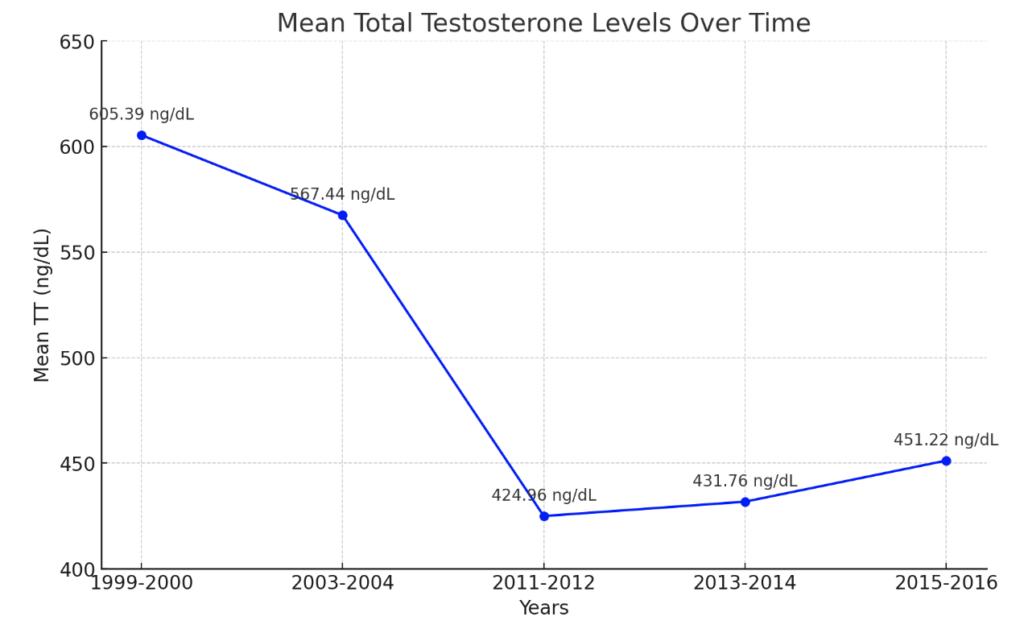
Additionally, sedentary lifestyles, poor dietary habits, and increased stress levels have been linked to lower testosterone levels. Regular physical activity, a balanced diet rich in nutrients, and effective stress management strategies can help mitigate these factors and support healthy testosterone levels.
Furthermore, certain medical conditions, such as obesity and type 2 diabetes, have been associated with decreased testosterone production. Maintaining a healthy weight and managing these underlying health issues can play a crucial role in maintaining optimal testosterone levels.
This article will take a deep dive into the best supplementation ingredients you can start today to start improving the production of testosterone in your body.
Ingredient 1: Ashwagandha
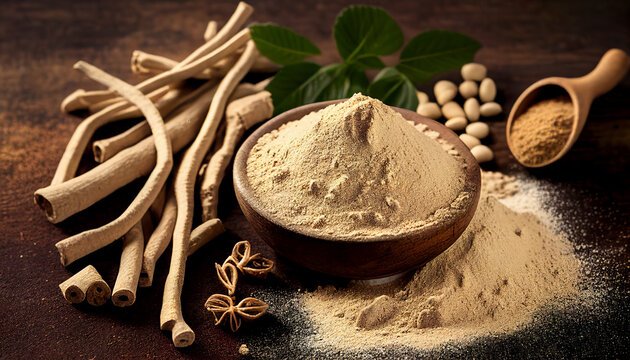
Ashwagandha, scientifically known as Withania somnifera, is an adaptogenic herb that has been used in traditional Ayurvedic medicine for centuries. This herb is particularly renowned for its ability to reduce stress and anxiety, promoting overall well-being. Recent studies have increasingly highlighted its impact on hormone regulation, particularly testosterone levels in men. The use of Ashwagandha has been associated with enhanced fertility and improved reproductive health.
- Research findings indicate that Ashwagandha supplementation can lead to significant increases in serum testosterone levels. A notable study involving men undergoing stress found that those who supplemented with Ashwagandha experienced a substantial rise in testosterone, alongside a decrease in cortisol levels, the hormone associated with stress. This hormonal balance is crucial, as elevated cortisol can negatively impact testosterone production. By mitigating stress through its adaptogenic properties, Ashwagandha helps create a more favorable environment for testosterone synthesis.
Furthermore, Ashwagandha may improve sperm quality and increase libido, making it a promising natural tool for men’s health. Its bioactive components, such as withanolides, are believed to play a vital role in modulating endocrine function and enhancing vitality. These compounds can promote mitochondrial health and support cellular energy production, which are essential for optimal reproductive function. Thus, the action of
Ashwagandha extends beyond mere hormonal regulation to encompass overall reproductive health.
Incorporating Ashwagandha into one’s regimen may offer a natural approach to boosting testosterone levels and promoting fertility. Its positive impact on stress management and hormone balance highlights the importance of this apoptogenic herb in enhancing male health outcomes. As research continues to unfold, Ashwagandha stands out as a scientifically backed natural ingredient for those seeking to enhance their testosterone levels and overall male vitality.
Ingredient 2: D-Aspartic Acid
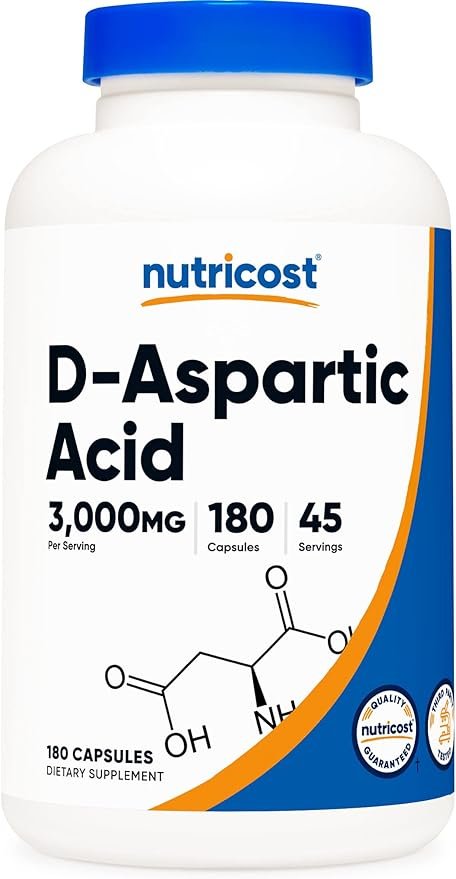
D-Aspartic Acid (DAA) is a naturally occurring amino acid that plays a crucial role in hormone production, particularly in the synthesis of testosterone. Found predominantly in the brain, endocrine glands, and reproductive tissues, DAA serves as a signaling molecule that can influence the release of luteinizing hormone, a key promoter of testosterone synthesis. Research indicates that supplementing with D-Aspartic Acid can lead to significant increases in testosterone levels, particularly in men who may have lower baseline levels due to age or other factors.
- A study published in the journal “Reproductive Biology and Endocrinology” highlighted that DAA supplementation resulted in a notable rise in testosterone levels over the course of 12 days. In this study, participants experienced an average increase of 42% in testosterone after merely 12 days of supplementation, suggesting that DAA may be particularly beneficial for those seeking to enhance their testosterone production in a relatively short timeframe. This effect is particularly relevant for older men, who generally experience a gradual decline in testosterone due to aging.
Furthermore, D-Aspartic Acid has been linked to improved reproductive health, offering potential benefits for those facing fertility challenges. Another study found that men with fertility issues exhibited a marked boost in testosterone levels after DAA supplementation, alongside improvements in sperm quality and quantity. This supports the notion that D-Aspartic Acid can contribute positively to both hormonal balance and reproductive function.
In conclusion, the evidence for D-Aspartic Acid’s role in boosting testosterone levels is compelling, particularly for men with lower initial levels. By acting on hormonal pathways, DAA shows promise not just for enhancing athletic performance but also for supporting reproductive health and overall well-being. As with any supplement, individuals should consult healthcare professionals to assess personal health needs before beginning any new regimen.
Ingredient 3: Zinc
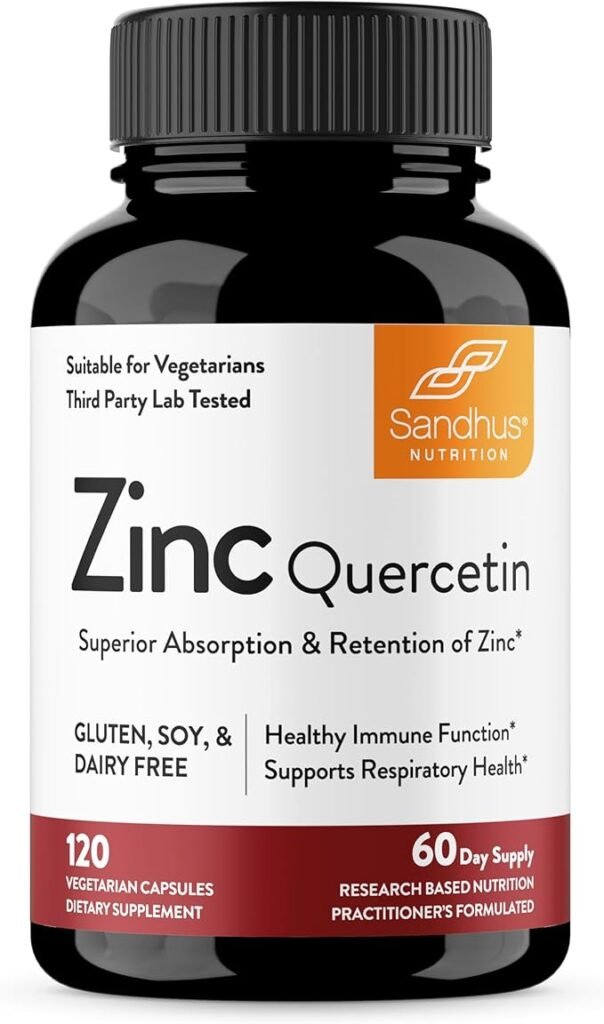
Zinc is an essential trace mineral that plays a crucial role in numerous biological functions within the human body, particularly in the production of hormones such as testosterone. It is well-documented that zinc deficiency can lead to various health issues, including hypogonadism characterized by low testosterone levels. Scientific evidence supports the notion that maintaining adequate zinc levels is critical for hormonal balance, especially in men.
- Research has demonstrated a direct connection between zinc intake and testosterone levels. A study published in the “Journal of Human Nutrition and Dietetics” highlighted that men with marginal zinc deficiency exhibited significantly reduced testosterone levels compared to those with sufficient zinc intake. The findings suggest that optimal zinc levels are necessary for the synthesis of testosterone, effectively indicating that individuals with low zinc might experience a decline in testosterone production.
Moreover, zinc supplementation has been shown to have positive effects on testosterone levels, particularly in individuals who are deficient in this mineral. In a controlled study involving healthy men, those who received zinc supplements displayed an increase in testosterone levels after just a few weeks of supplementation. These results underscore the importance of zinc not only as a nutrient for overall health but also as a potential adjunctive therapy for those experiencing low testosterone symptoms due to nutritional insufficiencies.
In addition to aiding testosterone production, zinc plays a role in the regulation of other hormones, including insulin and growth hormone, further illustrating its significance in maintaining overall hormonal health. With an increased understanding of the relationship between zinc and testosterone levels, individuals may want to consider their dietary zinc intake and consult healthcare professionals to manage deficiencies effectively.
Ingredient 4: Fenugreek
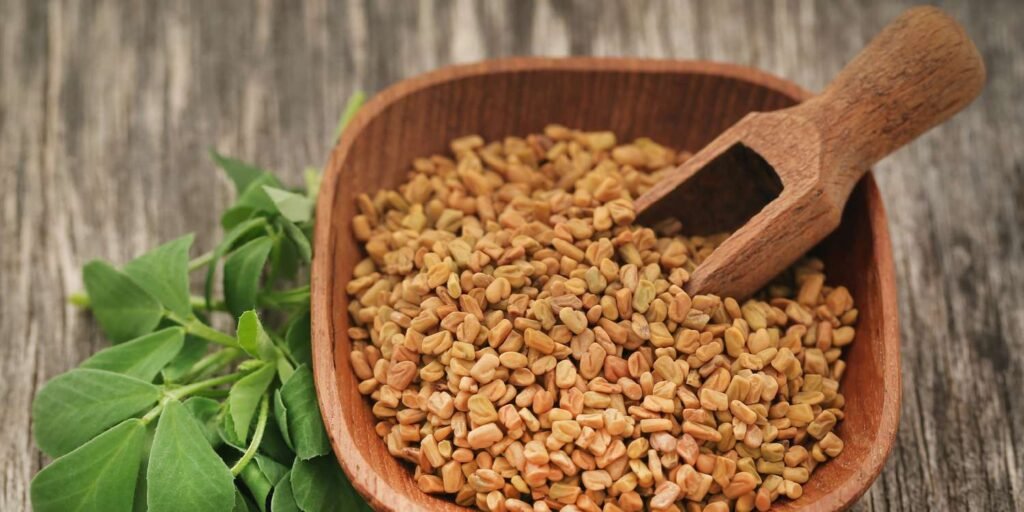
Fenugreek, a herb native to the Mediterranean region and commonly used in culinary practices, has gained attention for its potential role in boosting testosterone levels. This herb is not only a staple in many kitchens but also plays a significant role in traditional medicine. Research indicates that fenugreek may support testosterone production, thereby enhancing libido and overall male health.
- The active compounds found in fenugreek, particularly furostanolic saponins, have been identified as crucial players in promoting hormonal balance. These saponins are believed to stimulate the body’s production of testosterone, which may lead to improved sexual function and vitality. Several studies have explored the connection between fenugreek intake and testosterone levels, revealing promising results. For instance, a study published in the journal “Phytotherapy Research” showed that participants taking fenugreek extract experienced a significant increase in testosterone levels compared to the placebo group.
Moreover, fenugreek’s ability to elevate testosterone can also contribute to overall well-being. Enhanced testosterone levels correlate with increased energy, improved mood, and greater muscle strength, all of which can positively impact lifestyle quality. Additionally, fenugreek is reported to improve insulin sensitivity, which may indirectly support testosterone optimization by regulating blood sugar levels. This dual action on hormonal balance and metabolic health further strengthens fenugreek’s reputation as a beneficial herb for those looking to enhance testosterone levels naturally.
In the context of male health, fenugreek demonstrates considerable potential, supported by scientific evidence. With its incorporation into daily supplementation or diet, individuals might find not only an increase in testosterone but also a balanced improvement in overall health and well-being. This aligns well with the growing interest in natural solutions for hormonal health.
Ingredient 5: Vitamin D
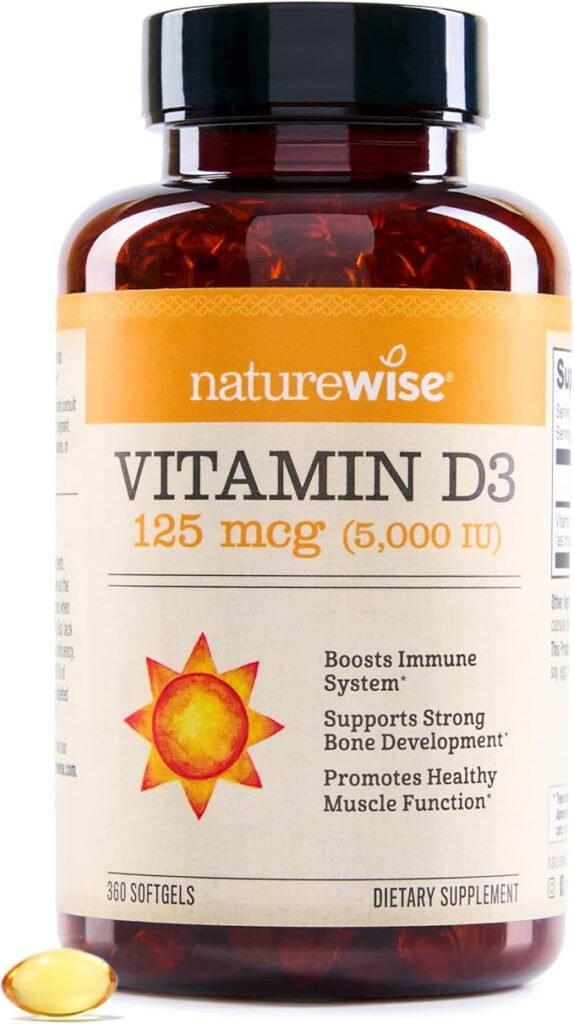
Vitamin D is a fat-soluble vitamin that plays a critical role in various bodily functions and is increasingly recognized for its influence on hormone levels, including testosterone. This vitamin can be synthesized by the body when exposed to sunlight, but many individuals may still experience deficiencies due to limited sun exposure, geographic location, or lifestyle factors. Research indicates a significant correlation between vitamin D deficiency and lower testosterone levels, particularly in men. Several studies have explored this relationship, demonstrating that optimal levels of vitamin D are associated with increased testosterone production.
- One such study published in the journal “Hormone and Metabolic Research” found that men with sufficient vitamin D levels had higher testosterone concentrations compared to those with deficiencies. The research suggested that vitamin D may exert its effects on testosterone through the modulation of the testicular function, therefore potentially enhancing the body’s ability to produce this vital hormone. Moreover, vitamin D receptors are present in the testicles, supporting the hypothesis that adequate vitamin D is essential for optimal testicular hormone synthesis.
Another important aspect to consider is that vitamin D can influence various bodily processes that indirectly affect testosterone levels. For example, it plays a role in muscle strength, body composition, and overall health, all of which can positively impact testosterone production. Factors like obesity have been linked to lower testosterone levels, and since vitamin D deficiency is common in overweight individuals, maintaining proper vitamin D levels may help mitigate some of these risks.
Ensuring adequate vitamin D intake — either through sunlight exposure, diet, or supplements — is crucial for maintaining optimal testosterone levels. While more research is needed to fully understand the extent of vitamin D’s influence on testosterone production, current evidence supports the notion that this important vitamin is integral to men’s hormone health.
Bonus: Magnesium
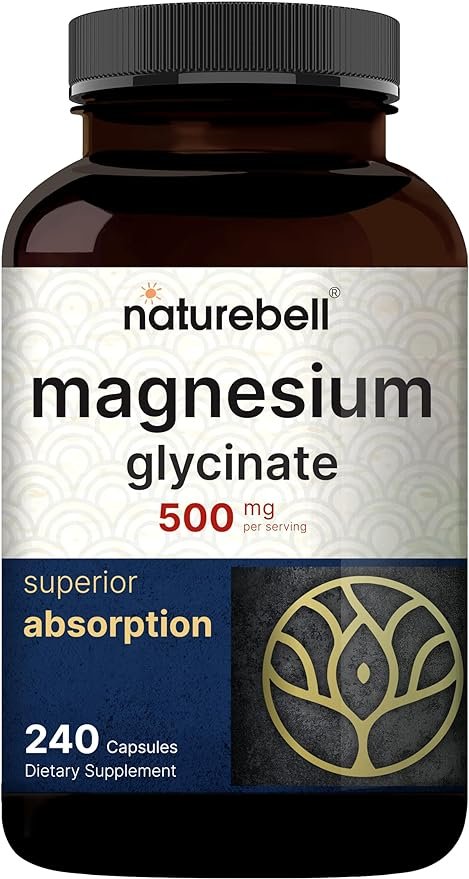
Understanding Magnesium’s Role
Magnesium is a crucial mineral that plays a significant role in numerous bodily functions. It is essential for energy production, muscle function, and nerve transmission. However, one of its most vital contributions is its positive impact on testosterone levels in males. Testosterone is a hormone responsible for various physiological processes, including muscle mass, bone density, and sexual health.
Magnesium and Testosterone Production
Research indicates that magnesium contributes to the regulation of testosterone levels. A deficiency in this important mineral can lead to decreased testosterone production. Studies show that adequate magnesium intake aids in increasing the bioavailability of testosterone, enhancing its effects in the body. Moreover, magnesium may help to reduce the conversion of testosterone to estradiol, a form of estrogen, promoting higher testosterone levels.
Dietary Sources of Magnesium
To ensure sufficient magnesium intake, it is essential to include magnesium-rich foods in your diet. Some excellent sources of magnesium are leafy greens, nuts, seeds, whole grains, and legumes. Incorporating these foods can help maintain optimal magnesium levels, thereby supporting testosterone production. Furthermore, considering magnesium supplements can also be beneficial, especially for individuals who struggle to meet the dietary requirements.
In conclusion, magnesium is a vital ingredient in boosting testosterone levels in males. By maintaining adequate magnesium levels through diet and supplementation, individuals can support their hormonal health and overall well-being.
How to Incorporate These Ingredients into Your Diet
Integrating natural ingredients known to boost testosterone levels into your diet can be both enjoyable and effective. Several strategies can enhance your testosterone levels while enjoying flavorful meals. First, it is essential to identify which foods are beneficial. Ingredients such as zinc and vitamin D-rich foods, healthy fats, and certain herbs should be prioritized.
Start with dietary sources rich in zinc, which can be found in foods like oysters, pumpkin seeds, and beef. Including a variety of these foods in your weekly meals can ensure adequate zinc intake, promoting optimal testosterone production. For instance, you can prepare a delicious seafood dish featuring grilled oysters or add pumpkin seeds as a topping on salads and yogurt.
Next, focus on foods high in vitamin D, such as fatty fish, egg yolks, and fortified dairy products. Incorporating these items into breakfast, such as scrambled eggs with salmon or a smoothie using fortified milk, is a practical approach. Additionally, exposure to sunlight can synthesize vitamin D, so spending at least 15 minutes outdoors daily can further support your testosterone levels.
Healthy fats are also crucial for hormonal balance. Sources such as avocados, nuts, and olive oil should be included in your diet. Utilizing olive oil for cooking or as a dressing for salads can enhance flavor while supporting testosterone levels. Moreover, consider incorporating herbs like fenugreek and ashwagandha, which can be taken in supplement form or as teas.
Lastly, experimentation with meal planning can help optimize your diet. Consider simple recipes that incorporate several of these ingredients, such as a hearty stir-fry with lean meats, vegetables, and healthy fats. Gradually adjusting your diet to include these testosterone-boosting ingredients can lead to notable improvements in your hormonal health.
Safety and Considerations
When exploring natural ingredients aimed at boosting testosterone levels, it is crucial to prioritize safety and informed decision-making. Consulting healthcare providers before initiating any supplementation regimen is essential for individuals considering such options. This proactive step allows for a comprehensive assessment of one’s health status, potential contraindications, and any underlying conditions that may be affected by supplementation.
Natural testosterone boosters can offer benefits; however, they are not universally suitable for everyone. Different individuals may experience varying responses to the same supplement, influenced by genetic factors, hormonal balance, age, and existing health conditions. These variables can lead to unintended side effects such as mood swings, anxiety, or gastrointestinal disturbances. Additionally, some natural ingredients may interact with medications, either enhancing or diminishing their effectiveness. Therefore, a thorough discussion with a healthcare professional can help mitigate potential risks, ensuring that the chosen supplements align with the individual’s overall health plan.
Moreover, while many natural ingredients are touted for their testosterone-boosting properties, it is essential to approach these claims critically. Scientific backing is vital; however, individual results may vary, and what works for one person may not necessarily work for another. Patients should monitor their body’s response to supplementation closely, and any adverse reactions should be promptly communicated to a healthcare provider.
In conclusion, while natural testosterone supplements present an alluring option for those seeking to enhance their hormonal health, the importance of safety and individualized care cannot be overstated. Ensuring a collaborative approach with healthcare professionals not only helps to maximize benefits but also protects against potentially harmful effects, paving the way for informed and responsible supplementation.
Other Lifestyle Changes to Boost Testosterone
In addition to dietary modifications, several lifestyle changes can significantly enhance testosterone levels in a natural and effective manner. One of the most impactful factors is exercise. Engaging in regular physical activity, particularly strength training and high-intensity interval training (HIIT), has been scientifically shown to increase testosterone production. Resistance training, such as lifting weights, is particularly effective, as it triggers hormonal responses beneficial for testosterone levels. Conversely, sedentary lifestyles can lead to hormonal imbalances, making it crucial to incorporate movement into daily routines.
Another critical element influencing testosterone levels is sleep quality. Research indicates that insufficient sleep or poor sleep patterns can lead to a marked decrease in testosterone. Men who regularly obtain less than seven hours of sleep per night are particularly at risk. Prioritizing adequate sleep and establishing consistent sleep routines can thus foster a healthy hormonal balance. Improving sleep hygiene by minimizing screen time before bed and creating a relaxing sleep environment can also contribute positively to testosterone production.
Stress management plays a vital role in maintaining optimal testosterone levels as well. Chronic stress elevates cortisol, a hormone known to negatively impact testosterone. Effective stress management techniques such as mindfulness, meditation, deep-breathing exercises, or engaging in hobbies can help lower cortisol levels and support a healthy testosterone balance. It is essential for individuals to find stress-reducing strategies that resonate with them and incorporate these practices into their daily lives.
Finally, weight control is pertinent to maintaining healthy testosterone levels. Excess body fat, particularly visceral fat, can disrupt hormonal balance and lead to decreased testosterone production. Achieving and maintaining a healthy weight through a combination of balanced nutrition and regular exercise not only enhances overall well-being but is also crucial for sustaining high testosterone levels. Individuals seeking to boost their testosterone levels should consider these lifestyle adjustments in conjunction with dietary changes for optimal results.
Conclusion: A Holistic Approach to Testosterone Health
Maintaining healthy testosterone levels is crucial for overall well-being, and adopting a holistic approach can significantly contribute to achieving this goal. Numerous studies have highlighted the importance of incorporating natural ingredients alongside healthy lifestyle choices to enhance hormonal balance. Integrating foods and supplements that are known to support testosterone production can be an effective strategy for men and women alike.
A diet rich in vitamins, minerals, and healthy fats is essential for maintaining optimal testosterone levels. Natural ingredients such as zinc, vitamin D, and omega-3 fatty acids play pivotal roles in hormone synthesis and regulation. By prioritizing these nutrients through whole foods, individuals can create a positive impact on their hormonal health. Furthermore, it is essential to consider the quality and source of these ingredients to ensure maximum efficacy.
In addition to dietary choices, lifestyle factors such as regular physical activity, sufficient sleep, and stress management techniques also contribute significantly to hormonal balance. Engaging in regular exercise, particularly resistance training, has been shown to boost testosterone levels. Adequate sleep is equally important, as it allows the body to recover and regulate hormonal functions effectively. Practicing stress management techniques, such as mindfulness or yoga, can further assist in reducing cortisol levels, which may indirectly support testosterone production.
Lastly, regular check-ups with healthcare professionals are essential for monitoring and addressing any hormonal imbalances. They can provide tailored advice and interventions if necessary. By combining the benefits of natural ingredients, healthy lifestyle choices, and routine health assessments, individuals can foster an environment conducive to maintaining healthy testosterone levels. Adopting this holistic approach not only promotes better hormonal health but also enhances overall well-being and quality of life.

